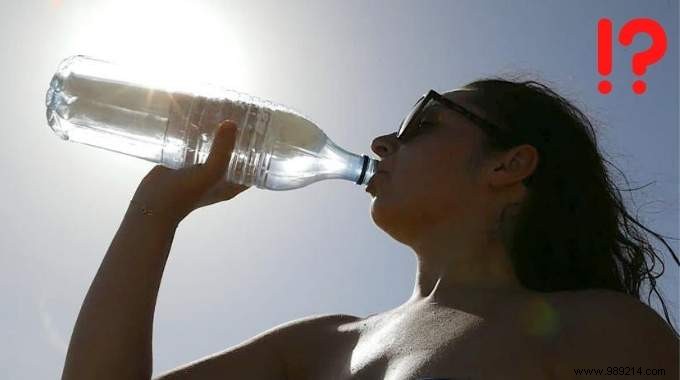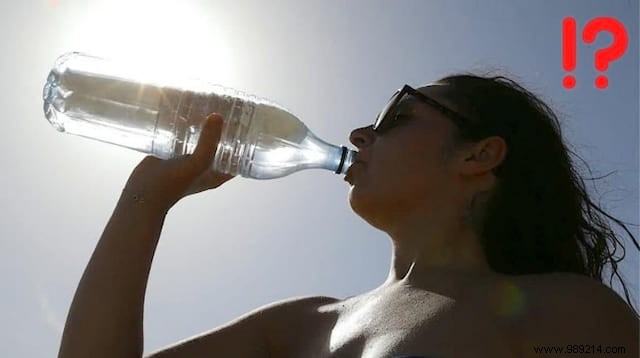
That's it, the first heat wave of the summer is here!
As a result, we are very hot even during the night...
So what should we do to cool off?
Certain reflexes and received ideas can make us make bad decisions...
...and instead of cooling us down, warming us up and dehydrating us!
So to see more clearly, we have sorted out the good and bad ideas. Explanations:

We sometimes dream about it all day behind our desk:an icy shower.
But you should know that the body feels it more like an attack.
He will struggle to maintain his temperature at 37°, which will require energy and release… heat!
Rather counterproductive. Beware of hot spells after the shower, which can cause dizziness and headaches.
Doctors strongly advise against freezing showers and recommend using temperate water (20-22°C).
It can also be good to enhance the effect of the fan by exposing yourself to it while your body is still wet.
If they feel the need, people at risk (children and the elderly) can also take several baths or showers a day, in order to better regulate their temperature.
Even young and in perfect health, you can suffer from dehydration.
With each heat wave, we deplore "very serious health accidents, including among vigorous and valiant people", declared Olivier Véran, who recommends drinking "water regularly during the day, even when we do not have necessarily thirsty".
But there is no question of gulping down 20 liters of water a day. "You have to drink appropriately. Often, but not too much", explained last summer the Director General of Health Jérôme Salomon, i.e. no more than a liter and a half per day in addition to foods already rich in water.
The risk of excessive water consumption is that of diluting the salt - in other words the sodium level - in the blood, especially in the elderly, suffering from certain chronic diseases or taking certain drug treatments.
This phenomenon, called "hyponatremia" even represents 25% of emergency room consultations for heat-related pathologies.
To discover: Did You Drink Enough Water Today? The Tip To Know.
There is a strong temptation to enjoy a breath of fresh air all night long and leave the fan or the air conditioning on.
Problem:it is sometimes very dry and cold air which after several hours may dry out the sinuses or the throat and cause cramps or muscle contractions.
Not to mention the risk for people with allergies, who are more exposed to air impurities.
Sleep in a well-ventilated room, why not, but you will have to find the right distance from the fan and avoid having it under your nose.
To discover: To Cool Your Room at Night, Point Your Fan Outwards, NOT Inwards.
In periods of great heat, "you have to eat", again reminded the Minister of Health.
"When it's very, very hot, we all experience the fact that we are less hungry.
However, eating is very important to regain strength," he explains.
On the menu, ANSES recommends "favor foods rich in water, such as fresh fruits and vegetables (watermelons, melons, strawberries, peaches, tomatoes, zucchini, cucumbers) as well as dairy products (yogurts, white cheeses)".
To discover: Heatwave:11 Foods to Avoid At All Costs When It's HOT.
It is possible to lower the ambient temperature of your home by installing wet sheets on the windows, on the curtain rods for example.
Do not hesitate to spray them with water regularly to maintain this refreshing effect.
Letting clothes dry indoors also increases the ambient humidity and makes the heat more bearable for those who live there.
To discover: 4 Simple and Effective Tips to Cool Your Home WITHOUT an Air Conditioner.
A lying down in the middle of a dodger? Why not.
Hot coffees and teas are not prohibited during heat waves, but be careful not to overdo it, as they have a diuretic effect.
On the other hand, it is clearly not recommended to drink ice water in hot weather.
When very cold water is consumed, the body will activate and expend energy to warm the body against this cold water.
The final effect will therefore not be refreshing.
During a heat wave, it is necessary to seek freshness at all costs, but ventilation is not necessarily a good idea.
"Close your windows, your blinds and your shutters during the sunniest periods, and wait until it is dark to ventilate", explains ANSES, because the colder temperatures will then cool the interior.
Ventilating the day will have the opposite effect, because the sun will come to heat the accommodation.
It's a simple but salutary gesture.
Televisions, computers, multiple chargers and even household appliances:plugged in, on standby, they produce heat, which diffuses into our homes.
Remember to unplug them.
You should also avoid cooking in the oven as much as possible and limit the use of electric or ceramic hobs which give off a lot of heat.
This is the best season to eat cold soups (gazpacho type) and mixed salads.
Clothing made of synthetic materials (polyester and acrylic) should be avoided as much as possible.
They do not allow perspiration to escape properly.
It is better to give preference to clothes made of cotton, linen or a thin layer of wool.
For those who work outdoors, it is best to wear light-colored clothing that will reflect the sun's rays.
It is also advisable to wear loose clothing, to be more comfortable.